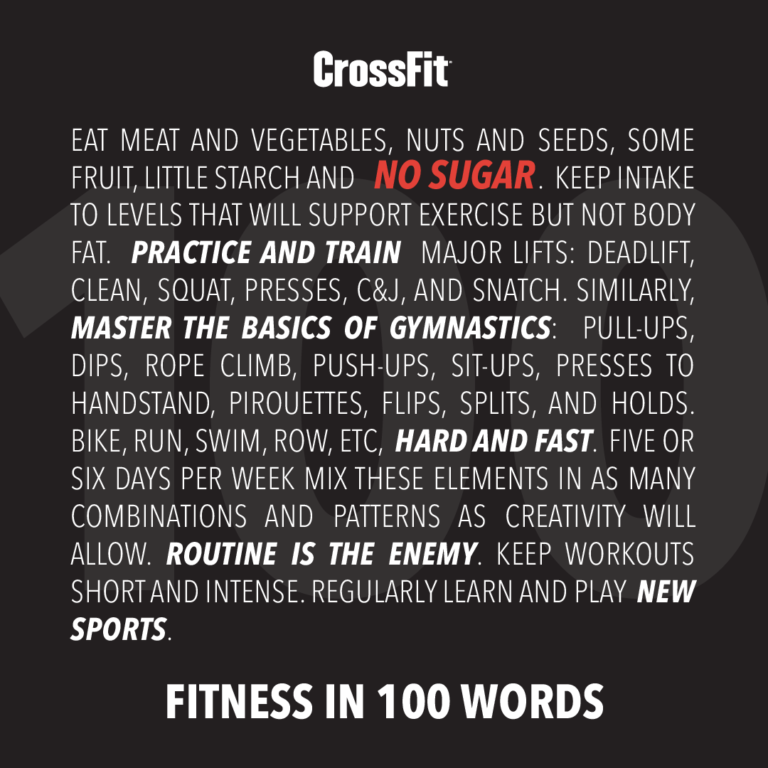 The CrossFit nutrition recommendation for “eating for wellness” is to eat meat, vegetables, nuts and seeds, some fruit, little starch, and no sugar. We describe this as “eating for wellness” because those who change their lifestyle to eat this way can expect to see their health markers move from sickness to wellness on the sickness-wellness-fitness continuum. Even those who are already well can expect to see improvements as they clean up their diet a little by replacing processed foods with whole, natural foods.
The CrossFit nutrition recommendation for “eating for wellness” is to eat meat, vegetables, nuts and seeds, some fruit, little starch, and no sugar. We describe this as “eating for wellness” because those who change their lifestyle to eat this way can expect to see their health markers move from sickness to wellness on the sickness-wellness-fitness continuum. Even those who are already well can expect to see improvements as they clean up their diet a little by replacing processed foods with whole, natural foods.
The most common critique received for this recommendation is that sugar is found in foods such as fruit, tubers, and even vegetables. This is true, but when we say “no sugar,” we mean no added sugar. This means we want you to avoid processed sugars and even sugar substitutes for the bulk of your diet. These include table sugar, high-fructose corn syrup, synthetic sweeteners, natural sweeteners, honey, syrups, etc. The occasional natural sweetener (honey, agave nectar, monk fruit, stevia, etc.) is likely nothing to worry about. But if you are a sugar addict and replace all your sugar consumption with natural sweeteners, you could potentially run into some issues. Though the research seems to be inconclusive, the potential risks involved with consuming sweeteners are increased cravings for sweet foods and gut issues (1, 2). Food gurus will counter these claims with claims of their own, stating that sweeteners are a perfectly safe alternative to sugar. This is the nature of nutrition science; the field is riddled with inconclusive and ideological claims. Think about it as a hierarchy. We are not sure what the actual implications of using sweeteners are. We do know that overeating processed carbohydrates can lead to a whole host of health issues (3). And we know that the safest way to eat carbohydrates is in their whole and natural state. This is why the CrossFit recommendation is to eat quality vegetables, fruits, and sources of starch while avoiding added sugar and sweeteners.
The natural sugar in carbohydrates eaten in their whole, natural forms — such as that found in fruit, sweet potatoes, carrots, or Brussels sprouts — is much less of an issue because there is a lot less of it there than in processed foods. Plus, whole, natural foods contain fiber, which provides satiety and helps slow down the amount of sugar released into the blood (4). When carbohydrates are processed, such as in high-fructose corn syrup, sucrose (table sugar), or even fruit juices, the fiber is removed, broken down, or pulverized to reduce its effects. This inevitably reduces the satiety effects of these foods and sends glucose and fructose into the blood at a much quicker rate (5). So, eating whole, natural sources of carbohydrates will help you reach the feeling of satiety quicker, and the fiber will prevent large spikes in blood glucose.
There are folks who state that foods such as fruits or vegetables should be left out of the diet. Though this may be true for those who have a food sensitivity, are severely metabolically deranged, or have some other medical condition, generally these foods are tolerated well and can be used in a diet targeting wellness. That said, there is always an opportunity to explore different macronutrient ratios when trying to optimize health and performance. There are some athletes who will thrive on fewer carbohydrates and others who perform better with more. When it comes to marrying health and performance, we are less concerned with how much and more concerned with what kind — or better yet, what quality — of carbohydrate you are eating (6).
CrossFit recommends eating meat, vegetables, nuts and seeds, some fruit, little starch, and no sugar when eating for wellness. “No sugar” does not mean you are avoiding naturally occurring sugar in whole, natural foods. It means for the bulk of your diet, you are not eating added, processed sugars or synthetic sweeteners.